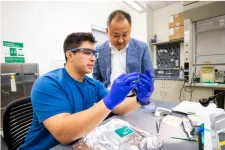(Press-News.org) A new study published this week in Science challenges the notion that only humans are capable of forming strong and strategic cooperative relationships and sharing resources across non-family groups. Researchers from Harvard University and the German Primate Center examined the pro-social behavior of bonobos (Pan paniscus), one of humanity’s closest living relatives, finding that their cooperation extends beyond one’s own group to societal cooperation with different groups.
Studying humans' two closest living relatives, chimpanzees and bonobos, can help reconstruct ancestral human traits like cooperation and conflict. Despite living in similar social groups composed of several adult members of both sexes, the two species are fundamentally different in how they interact across social groups. Among chimpanzees, our more studied relatives, relationships between different groups are predominantly hostile, and lethal aggression is not uncommon. As a result, models of human evolution often assume that group hostility and violence are innate to human nature.
Studying the bonobos unearths a different story. The endangered bonobos are notoriously difficult to study in their natural habitat, as they only live in remote, largely inaccessible parts of the Democratic Republic of the Congo. Harvard Professor Martin Surbeck and senior author on the study, who established and directs the research in the Kokolopori Bonobo Reserve, notes: “It is through strong collaborations with and the support of the local Mongandu population in Kokolopori, in whose ancestral forest the bonobos roam, that studies of this fascinating species become possible.”
Surbeck continued: “Research sites like Kokolopori substantially contribute not only to our understanding of the species’ biology and our evolutionary history, but also play a vital role in the conservation of this endangered species.”
When different groups of bonobos meet, they often travel, rest, and feed together. Unlike chimpanzees, researchers have not observed bonobo disputes that lead to lethal aggression. “Tracking and observing multiple groups of bonobos in Kokolopori, we’re struck by the remarkable levels of tolerance between members of different groups. This tolerance paves the way for pro-social cooperative behaviors such as forming alliances and sharing food across groups, a stark contrast to what we see in chimpanzees” says Dr. Liran Samuni, an Emmy Noether group leader at the German Primate Center in Göttingen and the lead author of this study.
The study finds that the bonobos do not interact randomly between groups. Instead, cooperation happens between a select few. “They preferentially interact with specific members of other groups who are more likely to return the favor, resulting in strong ties between pro-social individuals” says Surbeck. “Such connections are also key aspects of the cooperation seen in human societies.”
“Bonobos show us that the ability to maintain peaceful between-group relationships while extending acts of pro-sociality and cooperation to out-group members is not uniquely human,” says Surbeck.
Samuni added: “The ability to study how cooperation emerges in a species so closely related to humans challenges existing theory, or at least provides insights into the conditions that promote between-group cooperation over conflict.”
Human cultures, traditions, and social norms enable cooperation across our societies. The importance of this cooperation between different human groups is undisputed. It leads to the exchange of ideas, the spread of innovations, and the accumulation of knowledge over space and time. Human networks foster the exchange of resources, resulting in the trade of materials and goods that can offset shortfalls. Bonobos also share resources across groups, and they do so without any strong cultural influence.
The study’s authors emphasize the similarities between bonobo social cooperation and humans’.
According to the authors, the insights from bonobos should challenge the idea that culture and social norms are necessary components for cooperation between groups to emerge. The bonobos show that constant warfare between neighboring groups is not necessarily a human legacy and does not seem evolutionarily inevitable, the authors say.
END
Love thy neighbor: Cooperation extends beyond one’s own group in wild bonobos
2023-11-16
ELSE PRESS RELEASES FROM THIS DATE:
New molecular glue degraders could help target troublesome proteins
2023-11-16
Cells contain molecular machinery that targets and disposes of unwanted proteins to maintain homeostasis. Scientists think that with the help of “matchmaker” molecules called molecular glue degraders, this machinery could be hijacked to control proteins involved in diseases like cancer. But only a few of these glue degraders have been discovered so far—and mostly by chance.
Zuzanna Kozicka, as a Ph.D. student at Friedrich Miescher Institute in Basel, Switzerland, embarked on a deliberate search for these glues with her team and identified a novel class of molecular glue degraders with more than 40 chemically diverse members. Kozicka, who is now a postdoctoral ...
High efficiency and cooling performance in an electrocaloric heat pump
2023-11-16
Researchers have developed a solid-state electrocaloric cooling device that can generate a 20 kelvin temperature difference with high efficiency, according to a new study. The findings show that electrocaloric cooling can compete with other solid-state cooling strategies and offer a promising alternative to environmentally unfriendly vapor compression cooling. Cooling devices, including air-conditioning and heat pump systems, are estimated to consume roughly 20% of global electricity. Most of these systems operate through vapor-compression technologies, which are relatively inefficient and require environmentally harmful fluorinated refrigerants. Cooling through solid-state electrocaloric ...
The secret behind mussels’ quick-release interface
2023-11-16
The same bundle of non-living filaments that mussels use to anchor themselves within their environment – to withstand crushing waves, for example – can also be jettisoned on demand. Mussels create this quick-release interface, a new study finds, by way of a neurochemically-mediated junction, where billions of motile cilia hold fast to interlinked biopolymer sheets. "[The study’s] findings could be informative about how nonliving materials can be dynamically interfaced with living tissue, as in the case of detachable biosensors and medical implants," write Guoqing Pan and Bin Li in a related ...
Presenting a new GRAB sensor toolkit for neuropeptides
2023-11-16
New biosensors have helped reveal the activity of neuropeptides in the brain, researchers report, providing novel tools for studying the release, function, and regulation of these crucial signaling molecules in vivo. According to the study, the approach has the potential to address key questions regarding neuropeptides and their roles in health and disease. In the brain, neuropeptides are key signaling molecules in the body that regulate many critical physiological functions, including digestion, metabolism, sleep, and higher ...
UCSC doctoral graduate wins prestigious Science & SciLifeLab Prize for Young Scientists
2023-11-16
Jessica Kendall-Bar, who received her Ph.D. in ecology and evolutionary biology last year from UC Santa Cruz with co-advisors Terrie Williams and Dan Costa, was named a recipient of the prestigious Science & SciLifeLab Prize for Young Scientists for her research on elephant seal sleep habits while they are at sea.
The Science & SciLifeLab Prize is an international prize awarded by the American Association for the Advancement of Science (AAAS) and the journal Science to early career scientists for their outstanding thesis research in the life sciences. As ...
How cell identity is preserved when cells divide
2023-11-16
CAMBRIDGE, MA -- Every cell in the human body contains the same genetic instructions, encoded in its DNA. However, out of about 30,000 genes, each cell expresses only those genes that it needs to become a nerve cell, immune cell, or any of the other hundreds of cell types in the body.
Each cell’s fate is largely determined by chemical modifications to the proteins that decorate its DNA; these modification in turn control which genes get turned on or off. When cells copy their DNA to divide, however, they lose half of these modifications, leaving the question: How do cells maintain the memory of what kind of cell they are supposed ...
Liverpool’s chemists awarded Queen’s Anniversary Prize for pioneering research to address global challenges
2023-11-16
The University of Liverpool’s Department of Chemistry has been awarded a prestigious Queen’s Anniversary Prize in recognition of its pioneering research and innovation work to address global challenges and benefit society.
The Queen’s Anniversary Prize is the highest national honour in Higher Education. It is awarded in recognition of world-class excellence and achievement to a small selection of UK institutions every two years.
The Department of Chemistry at the University of Liverpool carries out world-leading research that pushes forward the frontiers of ...
Technique enables AI on edge devices to keep learning over time
2023-11-16
Personalized deep-learning models can enable artificial intelligence chatbots that adapt to understand a user’s accent or smart keyboards that continuously update to better predict the next word based on someone’s typing history. This customization requires constant fine-tuning of a machine-learning model with new data.
Because smartphones and other edge devices lack the memory and computational power necessary for this fine-tuning process, user data are typically uploaded to cloud servers where the model is updated. But data ...
Department of Chemical Engineering receives $3.5 million award to study impact of adolescent exposure to opioids
2023-11-16
Opioid addiction is a pressing public health crisis with far-reaching implications. More than 100,000 deaths a year have been linked to drug overdoses since 2020.
The Centers for Disease Control and Prevention reports that more people died from drug overdoses in 2021 than from firearm and motor vehicle deaths combined. Three-quarters of these overdose deaths were attributable to opioids.
A five-year, $3.5 million grant from the National Institutes of Health’s National Institute on Drug Abuse will fund the Virginia Tech Department of Chemical Engineering’s pioneering research to understand how adolescent ...
Terrorism rather than pandemics more concerning for those with those with authoritarian views, analysis shows
2023-11-16
Those with authoritarian political views are more likely to be concerned about terrorism and border control than a future new health pandemic, new research shows.
During the pandemic, rather than a desire for a stronger government with the ability to impose measures to address the pandemic and its consequences, people with authoritarian views rejected this and embraced individual autonomy.
Researchers analysed public perceptions of security threats in 2012 and in 2020. They believe COVID-19 belongs to a distinct category of threats of which those with authoritarian views are less ...




